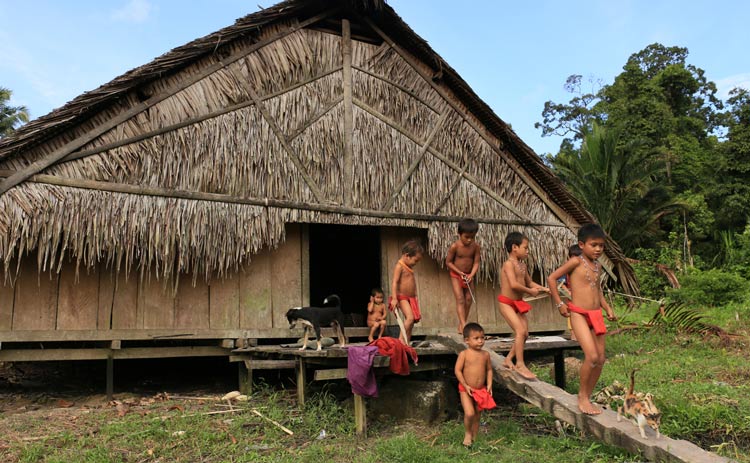The culture, the way of life in constant connection with the forest, and the Sabulungananimistic spirituality of the Mentawai people on the island of Sibérut are being threatened. The indigenous clans live far away from the cities, the island’s coastal villages, and the government villages of the interior. Many are tempted to draw closer to these villages, which are equipped with schools for their children. Besides, the Indonesian government does its best to encourage the tribal groups of the interior to settle in these government villages by offering them housing. As for the schools, most are either Christian or Koranic. This leaves the indigenous population at the mercy of systematic acculturation and complete control on the part of the Indonesian government’s religious authorities. With this systematic program of acculturation, nothing allows the children to connect with the traditional way of life of their parents known as Boudaya, or with their rich animistic spirituality called Sabulungan. Their children have no access to education. Those who want to go to school have to walk all the way through the jungle, along river courses and on spongy ground, which can prove hazardous for the younger ones. Other children, among them the remote Umas, prefer to stay in the boarding schools, next to the Christian and Muslim confessional schools.
Goals
The program put forward by our local correspondent, Sarul Sakaliu, is to offer an alternative to this non-choice with the jungle Sabulungan schools, in order to provide:
• a standard education in the Indonesian language, and courses in mathematics and other basic subjects;
• lessons on Boudaya culture, particularly on history, lifestyle, legends, herbal medicine, the environment, Sabulungan animistic spirituality, and more generally everything that constitutes the rich and dense Mentawai indigenous culture. All this deep in the jungle, in the Mentawai and Indonesian languages, in continuity with the children’s everyday life.
Person in charge : Saruyl Sakaliou
Practical assistance
In 2015 Saruyl is alone to start his rounds, before the program has even been launched. From one to three weeks a month he visits various umas situated one- to two-hours’ walk from the villages of Madobak and Kulukubuk, where several families are expecting him. Saruyl oversees this program with three Mentawai students. Every fortnight, in turn they visit four umas, two of them very far away in the Sibérut jungle, for a week-long teaching session. The two umas in the Atabai region number 37 people, among them 29 children aged 5 to 11. The other two umas, in Atanusa, number 48 people, including 11 children aged 7 and 8. The Butui uma, where they have been teaching since the program started, numbers 10 adults and 14 children aged 6 to 14.This strategy is not ideal. Saruyl, the project leader, and the teaching teams have been considering the construction of one or more forest schools on the model of large traditional umas.
Construction of the first school in 2019 : The first school will be built this year already, in one of the more remote areas. There will be an indigenous teacher and it will be run by the project coordinator, Saruyl Sakaliou. If this first school is a success, and if other clans and families ask for one, we will then build and open a second school. This way we hope to build several schools, five in all as a first step, in the most remote forest areas where the last traditional Mentawai clans have settled. The Mentawai have a strong connection to their clans and families. The separation of children from their parents is always a painful and detrimental experience for them. The goal of these schools is to keep alive the rich Mentawai cultural life while offering the children of the clans that have kept their traditions and spirituality the opportunity to keep on living close to their families right there in the forest, rather than be forced to migrate to the towns and government villages where they will be subjected to a relentless process of acculturation.
The FRAT association and Travel Sensations have decided to support this program.
‹ Go Back

